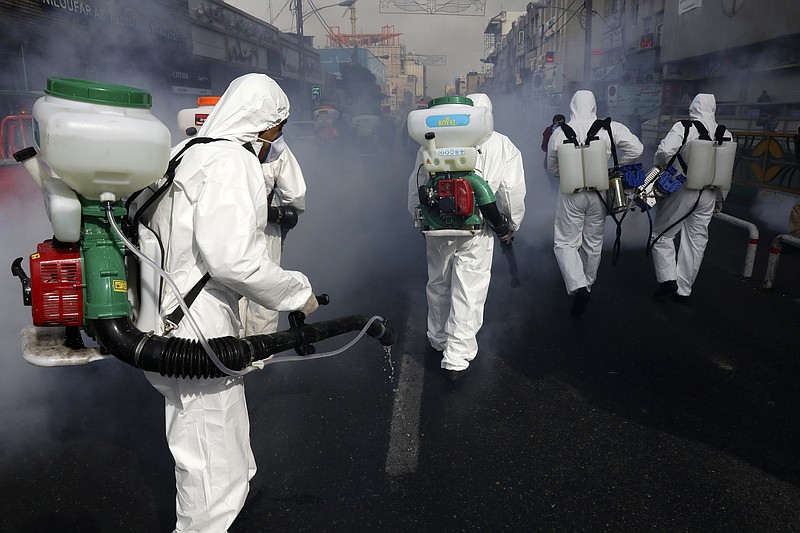TEHRAN, Iran (AP) - Iran said Saturday the coronavirus outbreak has killed another 97 people, pushing the death toll in the country to 611, as war-ravaged Syria announced a number of strict measures despite the government saying it has no confirmed cases.
Iran is suffering from the worst outbreak in the Middle East, with 12,729 cases and even senior officials testing positive. It is a close ally of the Syrian government in the civil war, with military advisers as well as Shiite pilgrims frequently traveling between the two countries.
[]
There are concerns the number of infections in Iran is much higher than the confirmed cases reported by the government, with some Iranian lawmakers having questioned the official toll.
It's also unclear if local hospitals are able to cope with the influx of new cases, with at least 2,500 new infections announced in just the last two days. State TV reported earlier this week that hospitals in some areas are overwhelmed. Authorities have vowed to set up mobile clinics, but have not provided figures on needs and capabilities.
The outbreak has not spared Iran's top officials, with its senior vice president, Cabinet ministers, members of parliament, Revolutionary Guard members and Health Ministry officials among those infected.
Iran has suspended schools and banned spectators from stadiums, but religious shrines remain open and the markets and streets are still crowded in the capital, Tehran, which has been hit hardest by the virus.
State TV said authorities would "soon" close the Masoume shrine in the holy city of Qom, the epicenter of the country's outbreak, without giving a timeline. Iran has already applied some restrictions at the popular pilgrimage site, including forbidding the traditional practice of touching and kissing the metal grating.
For most people, the new coronavirus causes only mild or moderate symptoms, such as fever and cough. For some, especially older adults and people with existing health problems, it can cause more severe illness, including pneumonia.
The vast majority of people recover from the new virus in a matter of weeks, but the outbreak has caused more than 5,000 deaths worldwide.
The virus is highly contagious, and even those showing no symptoms can spread it, making large gatherings particularly risky. A number of major sporting events, conferences and other gatherings have been cancelled across the globe.
The Syrian government announced a series of precautionary measures, including closing schools and universities until April 2.
Following a Cabinet meeting Friday evening, the government also said it was canceling all cultural and sporting events, and all other large gatherings, for the time being.
Syria also says it has taken preventive measures at all ports and border crossings. It has suspended travel with neighboring Iraq and Jordan, and it has halted religious tourism for a month.
Even in the tenth year of its devastating civil war, Syria had continued to receive large numbers of pilgrims from Iran, Iraq and neighboring Lebanon. They particularly visit the shrine of Sayida Zaynab, the prophet Muhammad's granddaughter, in a suburb of the capital, Damascus. The shrine itself remained open, and health officials were checking pilgrims' temperatures before allowing them entry.
Other countries across the Middle East are scrambling to contain the outbreak.
Israeli Prime Minister Benjamin Netanyahu announced Saturday that restaurants and places of entertainment would be closed and said everyone should work from home unless absolutely necessary. But he stopped short of declaring a total lock down, saying essential services would continue and grocery stores would remain open.
Israel imposed sweeping travel restrictions and quarantine measures more than a week ago, but its confirmed cases have almost doubled in the last two days, to nearly 200.
The United Arab Emirates, a major global travel hub, suspended the issuing of visas to all foreigners except diplomats. It also suspended all flights to and from Lebanon, Syria, Turkey and Iraq.
Saudi Arabia said it would halt all flights to the kingdom for two weeks starting today.
Qatar said it would bar entry to all visitors from Italy, France, Germany and Spain, where the number of new cases is on the rise, and require holders of residency permits to enter quarantine for 14 days.
It also suspended entry from Sudan, which reported its first case, a fatality, earlier this week. Sudan, whose infrastructure has been devastated by decades of war and sanctions, banned public gatherings and closed schools and universities for the next month.

